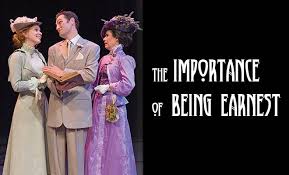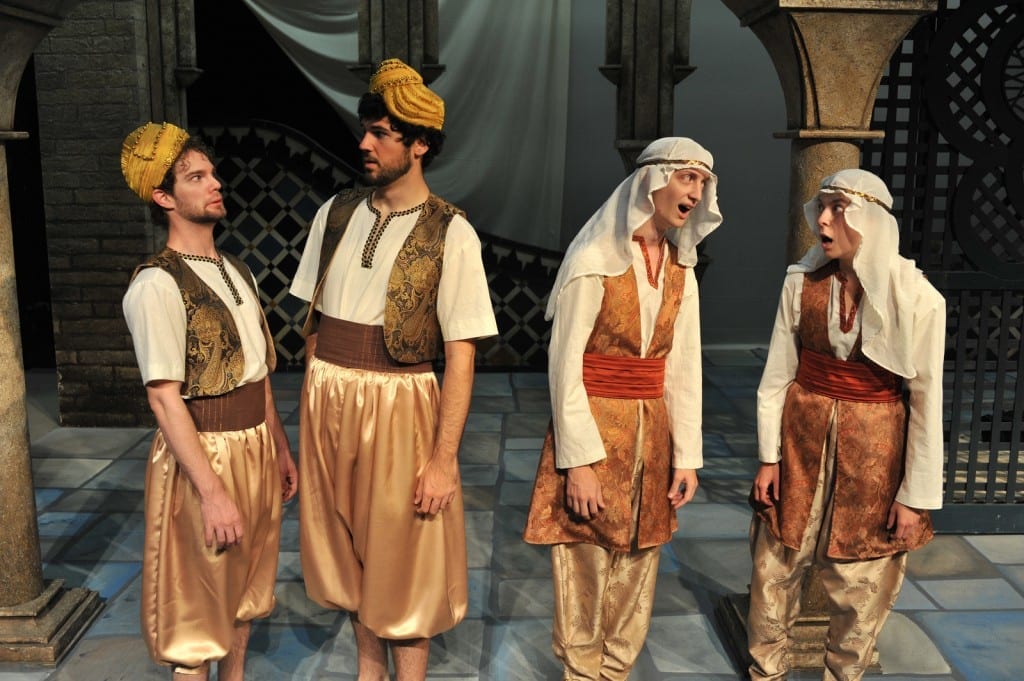PROVO — “One has to be serious about something if one is to have any amusement in life.” Thus Algernon Moncrief states in Oscar Wilde’s The Importance of Being Earnest. At the Covey Center for the Performing Arts, that amusement is taken very seriously, and director Lynne D. Bronson delivers a play rife with mockery of very serious things. However, this mockery helped me in recognizing through this farce of manners some familiar hypocrisies in modern society.
The production is full of pleasant moments. The performance of Tayva Patch as Lady Bracknell is the highlight of the play. Patch’s understanding of the requisite manners and social connections of Victorian times are clear as she plays this formidable matriarch with thoughtful and deliberate precision. Lady Bracknell has a clear philosophy that, “in matters of grave importance, style, not sincerity, is the vital thing,” and she has a style of her own that makes this clear to all those around her, should there be any doubt. Through Patch’s careful and clever performance, Lady Bracknell relishes her power over her daughter, her daughter’s suitor and, even when the tables momentarily turn, her abilities to manipulate and negotiate her will and her way. It seems possible that even the unforeseeable circumstances that lead to the play’s happy resolution may somehow have been within Lady Bracknell’s power to command, should she choose to declare it so.
Jessica Lake, as Miss Gwendolen Fairfax, also gives a commendable performance. Lake portrays this ingénue as a young woman who pays careful attention to all the requirements of social decorum and who will have her way through these acceptable behaviors, rather than in spite of them. Lake imbues Miss Fairfax with studied mannerisms that are the sort of affectatious behaviors a young woman of the period might carefully choose and employ, some in her interactions with men, and some with other young ladies. She even tries some of these “manners” on her mother, Lady Bracknell, who declines with impatient decorum to respond favorably, which is a source of delightful frustration to Miss Fairfax. Lake’s performance is warmly connected to her fellow cast members, and therefore Miss Fairfax is charming and calculated in the way a young woman in Victorian England ought to be.
Adam Argyle (as Jack Worthing) and Jordan Nicholes (as Algernon Moncrief) have engaging moments of verbal sparring as these characters make an accounting of their dull, idle, and purposeless high-society lives. Cleverness abounds in any piece by Oscar Wilde, and both Argyle and Nicholes relish the witticisms of their playwright. Unfortunately, Argyle appears to relish the wit a bit too much, as he often seems to be on the verge of breaking out in laughter at comic lines. However, Argyle does have a good sense of timing and pace, and he keeps the play in motion in spite of these frequent lapses. Argyle has a nice presence and commands attention when he is onstage. Nicholes convincingly plays the rogue Moncrief, a naughty young man with a mischievous grin who has so far gotten away with his . . . improprieties, and expects to do so indefinitely. As Moncrief, Nicholes is cocky and confident that his “Bunbury-ing” will always keep him a step ahead of the game.
Dr. Chasuble is amusingly awkward as portrayed by Joel Applegate, who gives the country vicar a comical mixture of sincerity and respectability, the very kind that many 19th century British writers (including Oscar Wilde) found irresistible to mock. Applegate allows Wilde’s mockery of the Anglican cloth to channel beautifully but harmlessly through him.
Scott Bronson and his “look-alike cast member Buzz Carter” portray the servants Lane and Merriman, respectively. The comedic acting techniques that both actors bring to their roles is a fascinating bit of theatricality that many audiences members will appreciate. Carter’s deft articulation and humor may lead him to the larger roles in the future. Bronson and “Carter” both had a connectedness with the other characters onstage that is impressive.
Cassie Walker (as Cecily Cardew) and Felesha Cairo (as Miss Prism) each give performances that round out the cast nicely. Walker portrays Cecily with an innocence that steers clear of becoming a caricature of empty-headedness, and relies instead on a fair-damsel archetype. Cairo brings consistency and steadiness to the character of Miss Prism, although perhaps it might be interesting to see Miss Prism experience a jolt or two as discoveries are made and revealed.
The program did not list the names of the production designers, except to mention that the gowns for Lady Bracknell were designed by Gloria Pendlebury. These gowns were beautiful, and in every detail they fit the period and the character’s position in society with precision. The drape of the skirts, the shape of the sleeves, and the weave and colors of the materials and adornments declared the position that such a lady would possess in fashion as well as society. The gown in Act I worn by Miss Fairfax was also lovely, and the men’s costumes were likewise befitting the period and position of their characters. However, in the second act things went awry with the costumes. With the exception of Lady Bracknell, there seems little continuity of period or quality. The design and fabric of the costumes did not live up to the attention to detail in the first act. The men’s and ladies’ attire seem to be a mix of varying materials, styles and periods.
The set is functional and gives a clear understanding of where the scenes are taking place with regards to period and immediate location. (Again, a designer’s name is not mentioned in the program.) The play opens in a Victorian parlor in a house in London, and this is precisely the appearance of the Brinton Black Box Theatre: a set dressed with fashionable 19th century furnishings and lovely window hangings. The versatility of the set is noteworthy; large, deep swinging shutters alter the scenes from the parlor to the garden of a country manor and then to the morning room of the manor. The production relies on two intermissions; only two people make these scene changes between acts, which might be a bit cumbersome. However, Wilde’s script is light and delightful, and the performances are nicely styled, so the frequency of long intermissions are not too much to ask of the audience.
This production of Oscar Wilde’s The Importance of Being Earnest is performed by actors who are clever and thoughtful. It is a pleasing production, with lines of dialogue and looks between actors that will linger in our memories and conversations long after the lights have lowered. It is a play that can be enjoyed by whole families, as well as teens and adults looking for a happy, humor-filled way to spend an evening.






